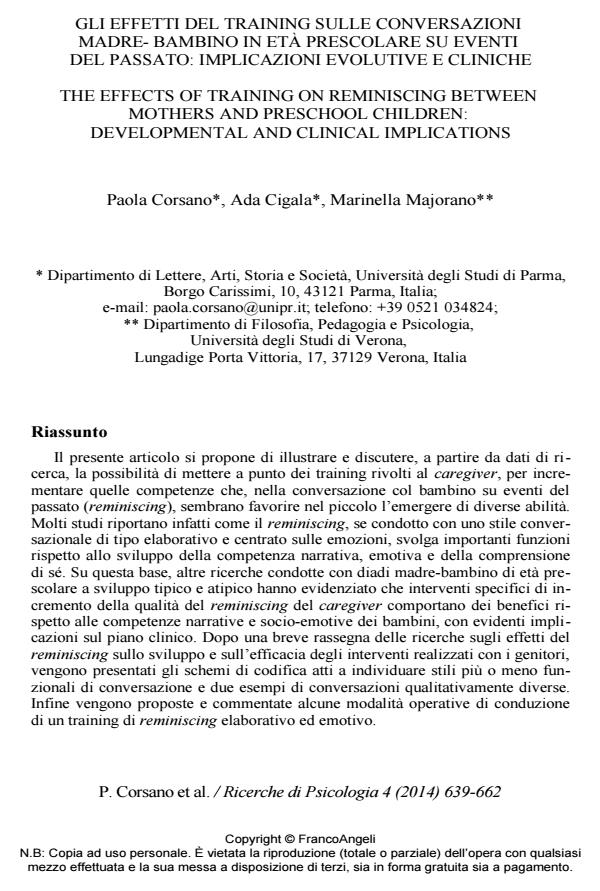Gli effetti del training sulle conversazioni madre- bambino in età prescolare su eventi del passato: implicazioni evolutive e cliniche
Titolo Rivista RICERCHE DI PSICOLOGIA
Autori/Curatori Paola Corsano, Ada Cigala, Marinella Majorano
Anno di pubblicazione 2015 Fascicolo 2014/4
Lingua Italiano Numero pagine 24 P. 639-662 Dimensione file 238 KB
DOI 10.3280/RIP2014-004007
Il DOI è il codice a barre della proprietà intellettuale: per saperne di più
clicca qui
Qui sotto puoi vedere in anteprima la prima pagina di questo articolo.
Se questo articolo ti interessa, lo puoi acquistare (e scaricare in formato pdf) seguendo le facili indicazioni per acquistare il download credit. Acquista Download Credits per scaricare questo Articolo in formato PDF

FrancoAngeli è membro della Publishers International Linking Association, Inc (PILA), associazione indipendente e non profit per facilitare (attraverso i servizi tecnologici implementati da CrossRef.org) l’accesso degli studiosi ai contenuti digitali nelle pubblicazioni professionali e scientifiche.
Il presente articolo si propone di illustrare e discutere, a partire da dati di ricerca, la possibilità di mettere a punto dei training rivolti al caregiver, per incrementare quelle competenze che, nella conversazione col bambino su eventi del passato (reminiscing), sembrano favorire nel piccolo l’emergere di diverse abilità. Molti studi riportano infatti come il reminiscing, se condotto con uno stile conversazionale di tipo elaborativo e centrato sulle emozioni, svolga importanti funzioni rispetto allo sviluppo della competenza narrativa, emotiva e della comprensione di sé. Su questa base, altre ricerche condotte con diadi madre-bambino di età prescolare a sviluppo tipico e atipico hanno evidenziato che interventi specifici di incremento della qualità del reminiscing del caregiver comportano dei benefici rispetto alle competenze narrative e socio-emotive dei bambini, con evidenti implicazioni sul piano clinico. Dopo una breve rassegna delle ricerche sugli effetti del reminiscing sullo sviluppo e sull’efficacia degli interventi realizzati con i genitori, vengono presentati gli schemi di codifica atti a individuare stili più o meno funzionali di conversazione e due esempi di conversazioni qualitativamente diverse. Infine vengono proposte e commentate alcune modalità operative di conduzione di un training di reminiscing elaborativo ed emotivo.
Parole chiave:Intervento con i genitori, ricordo condiviso, conversazione madre- bambino, età prescolare, linguaggio, emozioni.
- Reminiscing on acute and chronic events in children with cancer and their parents: An exploratory study Laura Guidotti, Federica Solari, Patrizia Bertolini, Erika Gebennini, Giulia Ghiaroni, Paola Corsano, in Child: Care, Health and Development /2019 pp.568
DOI: 10.1111/cch.12673
Paola Corsano, Ada Cigala, Marinella Majorano, Gli effetti del training sulle conversazioni madre- bambino in età prescolare su eventi del passato: implicazioni evolutive e cliniche in "RICERCHE DI PSICOLOGIA " 4/2014, pp 639-662, DOI: 10.3280/RIP2014-004007